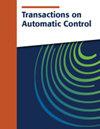具有海狸三重和通信混淆的隐私保护平均共识
IF 7
1区 计算机科学
Q1 AUTOMATION & CONTROL SYSTEMS
引用次数: 0
摘要
提出了一种将秘密共享理论和噪声混淆相结合的Beaver三重算法。该算法在多智能体系统中保护代理的初始值免受被动对手的攻击。实验证明,与基于加密的算法相比,该算法可以同时保证平均一致性和隐私性,同时减少在线计算和通信开销。此外,与某些噪声混淆技术相比,它对隐私保护的要求不那么严格。本文章由计算机程序翻译,如有差异,请以英文原文为准。
Privacy-Preserving Average Consensus With Beaver Triple and Communication Obfuscation
A privacy-preserving average consensus algorithm is proposed that synergizes the Beaver triple in secret sharing theory and noise obfuscation. The algorithm safeguards the initial values of agents against passive adversaries in a multiagent system. It is proved that the proposed algorithm can concurrently ensure average consensus and privacy, while also reducing the online computation and communication overhead compared to encryption-based ones. In addition, it imposes a less stringent condition for privacy preservation compared to certain noise-obfuscation techniques.
求助全文
通过发布文献求助,成功后即可免费获取论文全文。
去求助
来源期刊

IEEE Transactions on Automatic Control
工程技术-工程:电子与电气
CiteScore
11.30
自引率
5.90%
发文量
824
审稿时长
9 months
期刊介绍:
In the IEEE Transactions on Automatic Control, the IEEE Control Systems Society publishes high-quality papers on the theory, design, and applications of control engineering. Two types of contributions are regularly considered:
1) Papers: Presentation of significant research, development, or application of control concepts.
2) Technical Notes and Correspondence: Brief technical notes, comments on published areas or established control topics, corrections to papers and notes published in the Transactions.
In addition, special papers (tutorials, surveys, and perspectives on the theory and applications of control systems topics) are solicited.
 求助内容:
求助内容: 应助结果提醒方式:
应助结果提醒方式:


